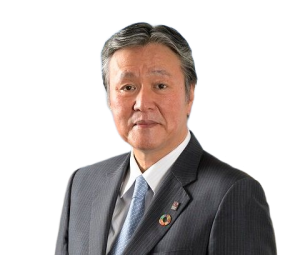Greetings

Chair Keiji Nishizawa
The global environment shows no signs of improvement and continues to deteriorate into an increasingly serious situation. According to the latest research on planetary boundaries, which indicate the health of the global environment based on scientific evidence, six of the nine indicators essential for maintaining the Earth’s stability and resilience have already exceeded safe operating limits, including climate change and biodiversity loss. Among these, biodiversity loss is rapidly gaining recognition as an urgent challenge facing the international community, on a par with climate change.
According to estimates by the World Economic Forum, some 44 trillion US dollars in economic value (over half of global GDP) depends on natural capital, and if biodiversity loss continues at its current pace, social and economic systems could suffer severe damage, potentially threatening human survival itself. Given that all corporate activities heavily depend on natural capital while simultaneously having significant impacts on it, integrating natural capital conservation and restoration into business management is essential.
The Keidanren Nature Conservation Council was established in 1992, the year of the Rio Earth Summit, as an organization led by Keidanren to put the Keidanren Global Environment Charter into practice. In 1996, we became the first economic organization in the world to join the IUCN (International Union for Conservation of Nature), the world’s largest nature conservation network. Since our establishment, we have promoted natural capital conservation and restoration through corporate outreach, information sharing, and policy recommendations both domestically and internationally, while supporting nature conservation activities by NGOs and NPOs in Japan and abroad, particularly in the Asia-Pacific region, through the Keidanren Nature Conservation Fund, with achievements totaling 1,820 projects and approximately 5.5 billion yen over 33 years.
In recent years, we have also focused on international advocacy activities, seizing opportunities such as the 16th Conference of the Parties to the Convention on Biological Diversity (CBD COP16) held in Cali, Colombia in October 2024, to engage in ongoing dialogue with world-leading organizations including the CBD (UN Convention on Biological Diversity) Secretariat, IUCN, UNEP (United Nations Environment Programme), UNDP (United Nations Development Programme), and WBCSD (World Business Council for Sustainable Development). Through these engagements, we have witnessed growing calls for strengthened cooperation with the Japanese business community and rising expectations for Japanese companies. We are confident that this is evidence of the high international recognition of our member companies’ sincere efforts spanning more than 30 years.
The Japanese business community must now strive to practice nature-positive management, contribute to achieving the global goal of recovering and restoring nature by 2030, and make this a source of its own international competitiveness. To achieve this, each company must act as a responsible entity, creating innovation through collaboration with diverse stakeholders, maximizing impact, and taking the lead in disclosing nature-related information. This will certainly not be an easy journey, but together with our member companies, we will steadily advance pioneering initiatives that lead the international community.
In closing, the Keidanren Nature Conservation Council will continue to pursue dialogue and cooperation with stakeholders both domestically and internationally, conducting activities toward realizing a sustainable society that coexists with nature. We sincerely hope that more Japanese companies will join us in working toward the conservation and restoration of natural capital.
October 2025
Keiji Nishizawa
Chair, Keidanren Nature Conservation Council

